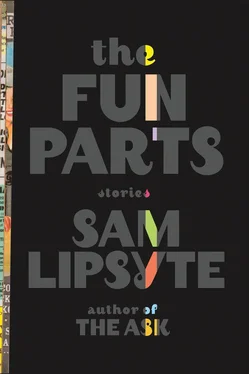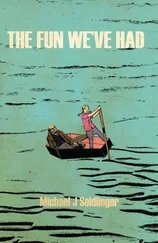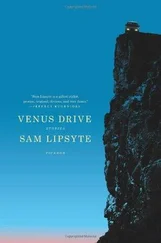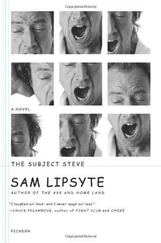“Me who?” I said.
“Debbie!”
Brianna giggled, blew me a French kiss. It mattered that she’d never loved me, or ever saw me as anything but a pleasant face to mount. I’d always known this, but never understood how germane it was to what I’d begun calling, suddenly, inanely, my life narrative, which I assumed would culminate in our bright joining.
But here was Debbie instead.
“Debbie!” said Davis to me. “Yes! Of course. Your reason to live, pal! Debbie! The tragic element of your demise.”
Davis pointed his oiled Lombardic hole puncher and took aim, as he had years before, when I had the soul of a laboratory coke mouse, craved only life’s jolt, couldn’t know wise joy.
“Debbie, honey,” I whispered. “Move away. I’ll be with you in a moment.”
I raised my arms and tilted my head in the manner of the carpentered carpenter.
“And now, ladies and gentlemen, to complete a procedure begun many, many years ago, when I, Standish James Davis, having been fired upon by this knave during the latter days of Bush the Elder, take, as my duelist’s right, the second and, fate willing, final shot of this contest. Furthermore—”
“Cap his monkey ass!” shouted Brianna.
Davis obliged.
* * *
Summertime, the neighbors come around to the backyard of the sweet rickety house Ondine sold us, watch me wheel up to the grills and baste the meats and flip them into Styrofoam boxes and thermal bags. We do only takeout, pork or beef, with biscuits and pop, and only on the weekend. We don’t even have an official name, but I hear some people call our operation the Capo’s, because a rumor floated that I was once some edge player in the North Jersey mob, got marked for a whack. Hence the wound, the wheelchair.
These are good people, but they watch too much television. Debbie, who works the register and is my wife, insists we do without one. We pass long evenings in our house drinking tea and talking about books and art and politics, or watching old movies on the computer, or having gentle, atrocious sex.
Sometimes Ondine comes over for poker or we all go out for chimichangas. Last time, after a few drinks, I asked Ondine about her daughter.
“Martha? She’ll never be happy with anybody but herself.”
“Lucky girl.”
“You lucked out, too,” said Ondine.
“I know,” I said. “But life gets really murky sometimes.”
“It’s true, honey. Like a fish tank nobody cleans. Just fish shit and dead fish. But that’s how you know it’s life.”
Debbie is a big deal over at the university, where she got a professorship as soon as I was healed enough to marry. We didn’t plan on Ypsilanti, but Michigan happened to want her. Sometimes I read her presentations for typos, but I don’t understand them. Turned out she was the brilliant one of our bunch.
I never charged Davis, and they ruled the shooting an accident. If I’d charged him, I could have taken him to civil court and gutted him, but he wasn’t lying about the disappearance of his family fortune. Last I heard, he ran some kind of permanent luau up on that Red Hook roof, and also a break-dancing camp for private school kids. Brianna, somebody told me, makes films of women giving birth alone in public spaces. I never even knew she liked that sort of thing.
I’m not sure why Debbie stays with me. Her devotion must have fixed itself to the memory of my brief, illusory splendor, or else she has some plan of revenge for the years I missed her charms. I would deserve that, if only because I know in my heart that if she were the ruined one, I would not stay.
It turns out you can live, even prosper, with that kind of truth. Until, I presume, you cannot.
I still wonder why our reenactment of that Pushkin story meant so much to Davis. My real confession is that I never even read the thing. Davis just told it to me. And the way he did so, now that I recall his manner, makes me suspect he hadn’t read it, either.
Typical, I guess. We were poseurs, but why do you think poseurs pose? Because they want to be invited to the dominion of the real, an almost magical zone of unselfed sensation, and they know their very desire for it disqualifies them. Consider that, the next time you cluck your tongue at some awful, grandiose fake.
Dude just wants to feel.
I did almost achieve that sensation, or a cheater’s version of it, but it had not much to do with Davis, or the rest.
It happened the night before I went to Red Hook, while I sat at the bar in the Hudson Lux. A woman took the next stool. She wore a silk dress with pearls, ordered one of those something-tinis. We introduced ourselves, but she had a thick accent and I couldn’t make out her name.
“You a hairy motherfucker,” she said, caressed my forearm where I’d rolled my sleeve.
“You want to see all of it?” I said.
Her room was just like my room, with more moon in the window.
We were on the bed when she asked the big New York, or at least Hudson Lux, question.
“What do you do?”
“I’m a barista by training,” I said. “Though I enjoy grilling. I’ve also been a schoolteacher and worked construction and run the night shift at a homeless shelter and interned at a men’s magazine.”
“You here on business?”
“Are you here on business?” I said.
“You mean right now?”
“Yes,” I said.
“Yes,” she said. “What do you want?”
“Well, part of me just wants to die, but the other part wants to live, to really live.”
“Okay,” she said.
I slipped my belt off slowly, slung it from a hook in the door, looped.
It all followed rather quickly after that, a surge of bliss, a great groinal shudder, a shell burst of froth and light. Then I got cold, fogged. I floated in a bitter-tasting cloud, but in that moment I also glimpsed everything that was good and sweet and fresh, and also incredibly refreshing and relaxing, and I saw how I could reach that place and remain there for a very long time. After that, I think, somebody clutched my legs, my knees, shoved me upward, and a bald man with an earpiece and a combat knife cut me down from the door.
The man who killed the idea of tanks in England — his afterlife.
— F. Scott Fitzgerald, The Crack-Up
The Man Who Killed the Idea of Tanks in England sipped tea in his parlor somewhere in England. Pale light trickled through the parlor’s leaded windows in that trickling manner of English light as pictured by a person who would not know. The Man Who Killed the Idea of Tanks in England was an old man now. He passed his days sipping tea in his parlor and staining his mustaches with smoke from his briar pipe. His legs, once strong enough to spur his horse at a Boer sniper’s nest or leap a boulder to avoid the whirling blades of a Mahdi charge, lay withered beneath the double layer of his tweed trousers and his dear dead wife’s favorite shawl.
It was difficult to believe it was 1983. How old was he? One hundred and twenty-five? He had lived to see so much, from the murder of the czar to the Austrian paperhanger to the American moon shot, not to mention those urchins with the safety pins through their eyebrows and their so-called music.
The Sex Pistols were the best of the lot.
Still and all, it would be better to die now. It seemed to him during these days of pale, pictured light that the only thing keeping him out of his coffin was an unanswered question: Why had he killed the idea of tanks in England? He had had his reasons and recalled them quite well, thank you. Tanks were clunky. Tanks were slow. Tanks looked silly compared with, for instance, a mounted detachment of the Scots Guards cresting a hill on a crisp autumn day. Yes, he had been there when Mr. Simms demonstrated his “motor-war car,” that boiler on wheels with the revolving Maxim guns. Impressive to a simpleton, perhaps, all those moving parts in the Daimler engine.
Читать дальше












